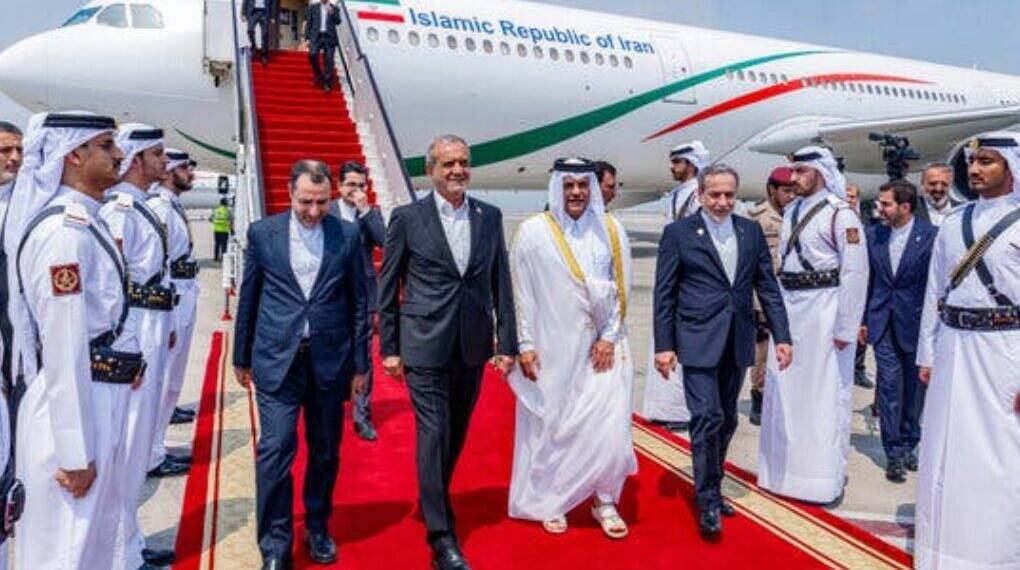In a bold and fiery address, Iran’s newly elected President Masoud Pezeshkian has called on Arab and Islamic countries to immediately cut all ties with Israel, citing the Jewish state’s relentless aggression and its perceived impunity under Western protection. The statement comes amid heightened regional instability following what Pezeshkian described as a “red line” crossing attack on Doha, Qatar’s capital, which has prompted an emergency summit of Middle Eastern leaders.
Pezeshkian’s Scathing Critique
Speaking at the summit, President Pezeshkian laid bare Iran’s frustrations with the international community’s handling of Israel’s actions. “Israel continues its attacks and escapes the law because it enjoys Western cover,” he declared, emphasizing that no nation in the Arab or Islamic world is safe from potential Israeli strikes. He stressed the urgent need for unity, stating, “We have no choice but to unite” against what he portrayed as a common threat.
The Iranian leader specifically highlighted the recent attack on Doha as a pivotal moment. “The attack on Doha crossed all red lines,” Pezeshkian said, underscoring the violation’s severity. This incident, according to him, exemplifies Israel’s unchecked aggression, bolstered by support from Western powers, particularly the United States.
Pezeshkian’s remarks are particularly significant given his relatively moderate stance during his presidential campaign earlier this year. Elected in July 2025 following the death of his predecessor Ebrahim Raisi, Pezeshkian has positioned himself as a bridge-builder in Iranian politics. However, his strong words on Israel signal a hardening of Tehran’s foreign policy amid ongoing conflicts in the region.
Emergency Summit in Doha: A Gathering of Regional Heavyweights
In response to the Doha attack, leaders from across the Middle East convened in the Qatari capital for an emergency summit aimed at formulating a unified strategy. Attendees included high-profile figures such as Turkish President Recep Tayyip Erdoğan and Palestinian Authority President Mahmoud Abbas, alongside representatives from Saudi Arabia, Jordan, Egypt, and other nations.
The summit, hosted in Doha despite the recent strike, underscores Qatar’s pivotal role in regional diplomacy. Qatar has long positioned itself as a mediator in Middle Eastern conflicts, facilitating peace talks between Israel and Hamas, as well as negotiations involving Iran and other actors. However, the attack has cast a shadow over these efforts, with Qatari officials expressing outrage and demanding greater international accountability.
Qatar’s Foreign Ministry issued a strongly worded statement, asserting that “Israel wouldn’t dare do this if the world actually held it accountable.” The statement reflects growing frustration among Gulf states, which have historically balanced relations with both Israel and the broader Muslim world.
The presence of the Al Udeid Air Base—the largest U.S. military installation in the Middle East—adds layers of complexity. Home to thousands of American troops, the base symbolizes the deep U.S.-Qatar alliance, yet the strike has raised questions about Washington’s ability to restrain its key ally, Israel.
Qatar’s Dual Role: Mediator and Target
Qatar’s involvement in peace processes has made it a linchpin in efforts to de-escalate tensions in Gaza and beyond. Since the October 2023 Hamas attacks on Israel, Doha has hosted multiple rounds of indirect talks between Israeli and Palestinian representatives, often under the auspices of the U.S. and Egypt. These negotiations have yielded fragile ceasefires and hostage releases, but progress has been stymied by mutual distrust and external pressures.
The attack on Doha, details of which remain sparse but are believed to involve Israeli airstrikes targeting suspected militant sites near the city, has inflamed these dynamics. Qatari leaders argue that such actions not only undermine peace efforts but also expose vulnerabilities in the region’s security architecture. “This incident demonstrates the fragility of our collective security,” a Qatari diplomat told reporters on the sidelines of the summit.
Critics, including some Iranian officials, have pointed to the U.S. presence in Qatar as a double-edged sword. While it provides a deterrent against direct aggression, it also ties Doha to American foreign policy, which is seen by many in the Muslim world as biased toward Israel. The strike, therefore, not only embarrasses Qatar but also highlights perceived inconsistencies in U.S. commitments to its allies.
Broader Implications for Regional Unity
Pezeshkian’s call to “ditch Israel now” resonates with longstanding sentiments in Iran and among hardline factions across the Islamic world. It echoes the rhetoric of Iran’s Supreme Leader Ayatollah Ali Khamenei, who has repeatedly condemned normalization agreements like the Abraham Accords as betrayals of Palestinian rights. Countries such as Saudi Arabia and the UAE, which have pursued economic and security ties with Israel, now face internal and external pressures to reassess these relationships.
The summit in Doha could mark a turning point. Discussions reportedly focus on economic sanctions against Israel, enhanced military cooperation among Muslim nations, and appeals to the United Nations for intervention. Turkish President Erdogan’s attendance is noteworthy; Ankara has been a vocal critic of Israel, providing humanitarian aid to Gaza and hosting Hamas leaders. Palestinian President Abbas, meanwhile, used the platform to reiterate demands for statehood and an end to Israeli settlements.
However, achieving unity remains challenging. Divergent interests—ranging from energy dependencies to counterterrorism partnerships with the West—could dilute any consensus. Analysts warn that while Pezeshkian’s words may galvanize public opinion, translating them into action will require overcoming deep-seated rivalries, including those between Sunni and Shia powers.
What next? A Region on the Brink?
As the summit concludes, the Middle East stands at a crossroads. The attack on Doha has not only strained Qatar’s delicate balancing act but also amplified calls for a reevaluation of alliances. Iran’s exhortation to sever ties with Israel taps into a well of resentment, potentially reshaping the geopolitical landscape.
Whether this leads to concrete measures or remains rhetorical posturing depends on the summit’s outcomes. For now, the message from Tehran is clear: unity against Israel is not just desirable but essential for survival in an increasingly volatile region.








